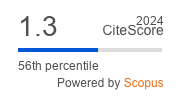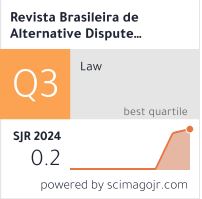From Courtrooms to Algorithms
The Evolution of Dispute Resolution with AI
Keywords:
Dispute Resolution, Artificial Intelligence, Mediation, Negotiation, Online Dispute ResolutionAbstract
Technology usage in the Dispute Resolution process across different levels has been
encouraged. Technology assists in making the process more accessible, convenient, and efficient for the parties involved. The development of Artificial Intelligence (AI) has seen calls for integrating the usage of technology with the adjudicatory process. The usage of alternative methods for the resolution of disputes, like arbitration, mediation, negotiation, and conciliation, which depart from the traditional courtroom litigation has further increased the scope for integration of AI into the process. The COVID-19 pandemic played an essential role in the shift towards these alternative methods and took the process of dispute resolution online. This has further allowed for the creation of a scenario where AI is introduced into the process. However, it still needs to be deciphered if the usage of AI is conducive or detrimental to the Dispute Resolution Process. The arguments in favour of AI revolve around increased efficiency, more possibility of resolution, and fair decisions. However, the lack of humane touch, human sympathy, and human emotions are sought as major grounds to dissuade the usage of AI. Moreover, being something programmed and developed by humans, the objectivity of the AI is also questioned. The extent and usage of AI in Dispute Resolution is a key contention that has been explored in this paper. It analyses the existing developments in AI, the application of Intelligent Resolution systems to already ongoing conflicts, and the potential for the future.
References
ANI, In a first, Punjab and Haryana High Court Uses Chat GPT for Deciding upon Bail Plea, The Times of India, Mar. 28, 2023, https://timesofindia.indiatimes.com/india/in-a-first-punjab-andharyana-high-court-uses-chat-gpt-for-deciding-upon-bail-plea/articleshow/99070238.cms?from=mdr (last visited Sep 20, 2023).
Arno Lodder & John Zeleznikow, Artificial Intelligence and Online Dispute Resolution, (2004), https://core.ac.uk/download/pdf/15470488.pdf (last visited Sep 21, 2023).
Cindy Gordon, ChatGPT Is the Fastest Growing App in the History of Web Applications, Forbes (2023), https://www.forbes.com/sites/cindygordon/2023/02/02/chatgpt-is-the-fastest-growingap-in-the-history-of-web-applications/?sh=7cd25af9678c. (last visited Sep 20, 2023).
Davide Carneiro et al., Online Dispute resolution: an Artificial Intelligence Perspective, 41 Artificial Intelligence Review 211 (2012).
Diana Shepherd, ‘How Artificial Intelligence Could Impact the Future of Family Law’ (Family Lawyer Magazine, 12 September 2019) <https://familylawyermagazine.com/articles/artificial-intelligenceand-the-future-of-family-law/> accessed 11 May 2020.
DONALD A. WATERMAN, JODY PAUL & MARK PETERSON, Expert Systems for Legal Decision Making, 3 Expert Systems 212 (1986).
Emilia Bellucci, Deborah Macfarlane & John Zeleznikow, How Information Technology Can Support Family Law and Mediation, Lecture Notes in Business Information Processing (2010).
Gladys Kessler & Linda Finkelstein, The Evolution of a Multi-Door Courthouse, 37 Cath. U. L. Rev 577 (1988), https://scholarship.law.edu/cgi/viewcontent.cgi?referer=&httpsredir=1&article=18 97&context=lawreview (last visited Sep 20, 2023).
Hibah Alessa, The Role of Artificial Intelligence in Online Dispute Resolution: a Brief and Critical Overview, 31 Information & Communications Technology Law 1 (2022).
Howard Raiffa, The Art and Science of Negotiation (1982), https://books.google.co.in/books/about/The_Art_and_Science_of_Negotiation.html?id=y-4T88h3ntAC&redir_esc=y (last visited Sep 20, 2023).
Janet L. Kolodner & Robert L. Simpson, The MEDIATOR: Analysis of an Early case-based Problem Solver, 13 Cognitive Science 507 (1989), https://www.sciencedirect.com/science/article/abs/ pii/0364021389900220 (last visited Sep 20, 2023).
John Zeleznikow, Comparing the Israel–Palestinian Dispute to Australian Family Mediation, 23 Group Decision and Negotiation 1301 (2011).
Katia P. Sycara, Machine learning for intelligent support of conflict resolution, 10 Decision Support Systems 121 (1993).
Laura Kistemaker, Rechtwijzer and Uitelkaar.nl. Dutch Experiences with ODR for Divorce, Family Court Review.
Luke Taylor, Colombian Judge Says He Used ChatGPT in Ruling, The Guardian, Feb. 3, 2023, https://www.theguardian.com/technology/2023/feb/03/colombia-judge-chatgpt-ruling (last visited Sep 20, 2023).
Margreet Vermeulen, DPG Media Privacy Gate, Dpgmedia (2023), https://myprivacy.dpgmedia.nl/consent?siteKey=PUBX2BuuZfEPJ6vF&callbackUrl=https%3a%2f%2fwww.volkskrant.nl%2fprivacy-all%2faccept%3fredirectUri%3d%252f%252520mensen%252fdoe-het-zelfscheidenop-internet%257ebb80ac25%252f (last visited Sep 21, 2023).
Mitchell Hamline & David Larson, Mitchell Hamline School of Law Artificial Intelligence: Robots, Avatars and the Demise of the Human Mediator Publication Information 25 Ohio State Journal on Dispute Resolution 105 (2010), (2010), https://open.mitchellhamline.edu/cgi/viewcontent.cgi?article=1352&context=facsch (last visited Sep 21, 2023).
N.R. Jennings et al., Automated Negotiation: Prospects, Methods and Challenges, 10 Group Decision and Negotiation 199 (2001).
Robert H. Mnookin & Lewis Kornhauser, Bargaining in the Shadow of the Law: The Case of Divorce, 88 The Yale Law Journal 950 (1979).
Roger Smith, DIGITAL DELIVERY OF LEGAL SERVICES TO PEOPLE ON LOW INCOMES QUARTERLY UPDATE, (2015), https://thelegaleducationfoundation.org/wp-content/uploads/2015/09/DigitalTechnology-Spring-2015.pdf (last visited Sep 20, 2023).
S. Matwin et al., Negoplan: an Expert System Shell for Negotiation support, 4 IEEE Expert 50 (1989).
S. Sarit Kraus et al., Resolving Crises through Automated Bilateral Negotiations, 172 Artificial Intelligence 1 (2008).
Social Value UK, Principles of Social Value, Social Value UK, https://socialvalueuk.org/principlesof-social-value/ (last visited Sep 20, 2023).
Sourdin T, Zeleznikow J (2020) Courts, mediation and COVID-19. To appear in Australian Business Law Review Tania Sourdin & John Zeleznikow, Courts, Mediation and COVID-19, papers.ssrn.com (2020), https://papers.ssrn.com/sol3/papers.cfm?abstract_id=3595910.
Steven Brams & Jeffrey M. Togman, Camp David: Was the Agreement Fair?, NYU Scholars 306 (1998), https://nyuscholars.nyu.edu/en/publications/camp-david-was-the-agreement-fair-2 (last visited Sep 20, 2023).
Uitelkaar.nl: Ervaringen Van Gescheiden Stellen, uitelkaar.nl (2022), https://uitelkaar.nl/infoover-scheiden/uitelkaar.nl-ervaringen-van-gescheiden-stellen#:~:text=68%25%20van%20onze%20 klanten%20vindt (last visited Sep 20, 2023).
Downloads
Published
Issue
Section
License
Copyright (c) 2023 Revista Brasileira de Alternative Dispute Resolution - Brazilian Journal of Alternative Dispute Resolution - RBADR

This work is licensed under a Creative Commons Attribution 4.0 International License.
No royalties or other compensation shall be due for the publication of the works.
The opinions expressed by the authors of the articles and reviews are their sole responsibility.









